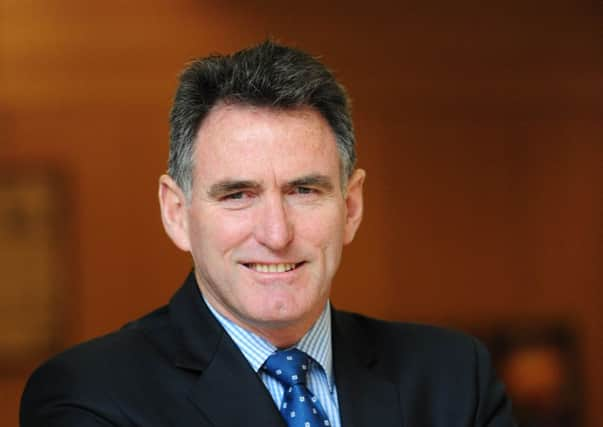Terry Murden: RBS Improvement only the beginning


The board rushed out the half-year figures on Friday, a week earlier than planned, taking the City by surprise and prompting an 11 per cent surge in the share price. Blimey, it was like a return to the good old days.
However, the red-hot news will quickly fade and McEwan is wise and cautious enough to keep the party atmosphere under control. A gang bearing legal suits and regulatory fines is waiting outside the doors of its palatial Gogarburn headquarters.
Advertisement
Hide AdAdvertisement
Hide AdOn the face of it, that should be enough to kill off any prospects of an early sale of the government’s 81 per cent stake in the bank. A prospectus laden with dire warnings of imminent penalties and fines is hardly a big incentive for investors to part with their cash. On the other hand, some may be tempted to buy cheaply in the certain knowledge that these punishments will be meted out and that the costs of such penalties are factored in.
That might also tempt George Osborne, the Chancellor, to try his luck. Despite Friday’s rise, the shares still trade 25 per cent below their break- even price of 500p and it will take a few more quarters of extraordinary growth – and a small miracle thrown in – for them to achieve their target any time soon. For that reason alone what is stopping Osborne cutting his losses and hoping that public opinion might just be on his side?
It doesn’t mean selling the whole lot in one issue, but in small tranches that will test investors’ appetite. By selling each tranche at a higher price, the loss is reduced, albeit marginally. This was the tactic employed by the US government, which spent $418 billion (£269bn) propping up its financial services and motor industry through the troubled asset relief programme (Tarp). The big US banks repaid their loans by the end of 2012. The decision for Osborne is, of course, a political gamble that must also take into account the criticism that surrounded the sale of Royal Mail.
He clearly wants to distance the government from the continuing misdeeds of the banks, but he would not want a distribution of shares at a loss to backfire ahead of a general election. Played correctly, however, it might be seen as part of an essential process of putting RBS back in private hands and a government prepared to play its chips in the hope that its number comes up.
While Osborne ponders his options, McEwan has more work to do and his mantra is to refocus the whole RBS group around the customer. This is easier said than done. As stated by Ian Fraser in his excellent new book Shredded, Inside RBS, the Bank that Broke Britain, McEwan may find it difficult to improve customer service at the same time as cutting costs.
McEwan is making RBS smaller, creating – as Fraser says – a “mini-me Lloyds Banking Group”. Is this wise? Most businesses aspire to grow, not shrink. RBS got too big, but the danger is that it becomes too small. It has already lost the loyalty of some of its investment bankers who sided with former chief executive Stephen Hester’s view that it should not be emasculated as it would lose the ability to compete.
It remains my contention that RBS is being punished into submission and that sooner or later it will be controlled, not only from outside Scotland, but outside the UK.